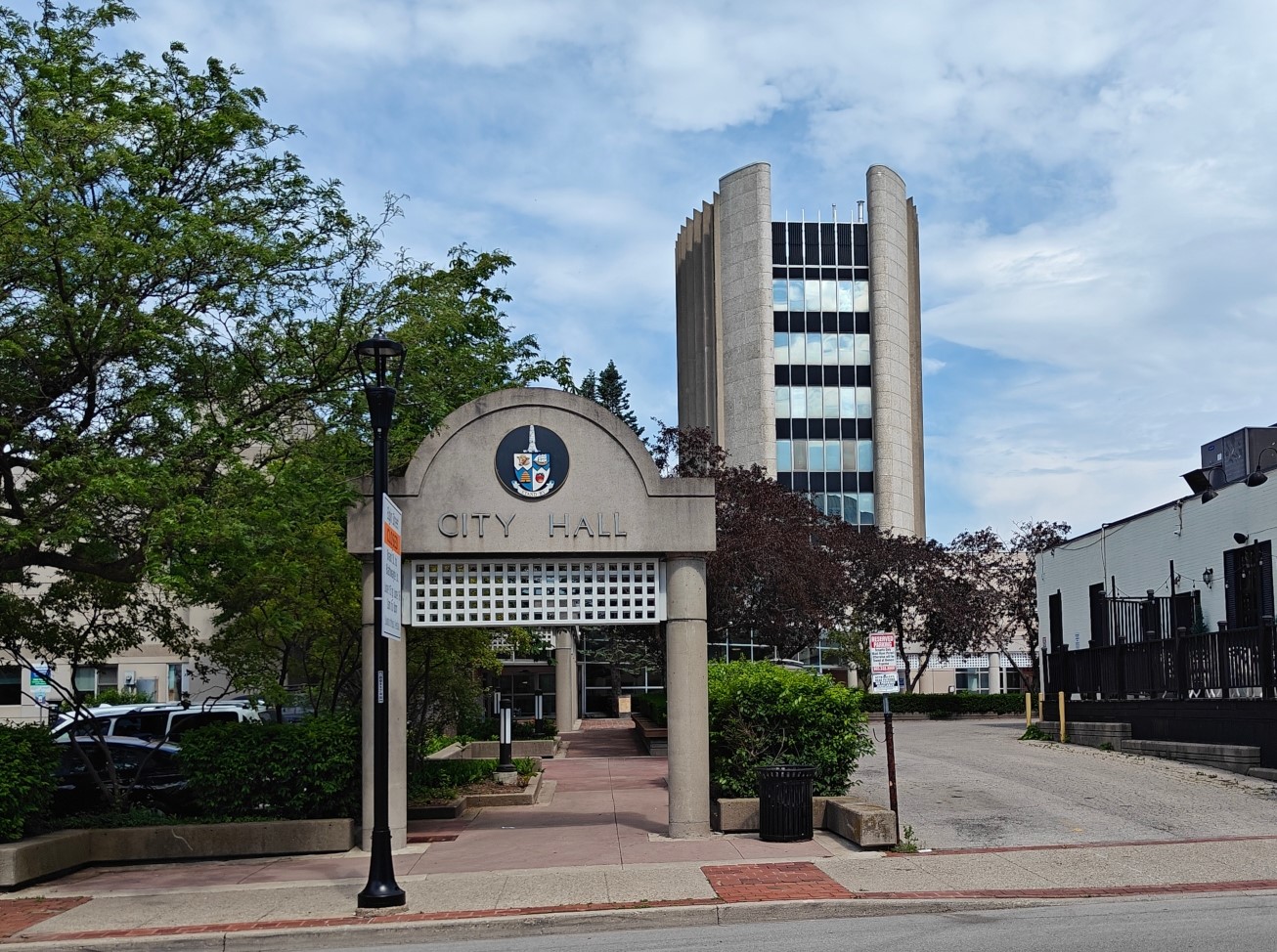By Jack Brittle, Local Journalism Initiative Reporter
On April 7, Burlington City Council held one of their monthly Committee of the Whole meetings to discuss various items relevant to the city and its citizens.
Council discussed a Tariff Response Report that was prepared by city staff, which investigated the impacts and risks of tariffs imposed by the United States.
Staff recommended an amendment to Procurement Bylaw 04-2022 to allow invitational bidding up to $133,800 to “provide greater flexibility in navigating the dynamic and challenging environment we are currently facing, while also enabling staff to invite bids only from qualified Canadian companies, and avoid U.S. vendors, where feasible.”
Craig Millar, chief financial officer, spoke about the proposal.
“It allows greater flexibility for staff to target more local and Canadian companies,” Millar said.
The city found that all competitively bid procurements completed within the last five years have been awarded to vendors who operate with a primary Canadian address, with the exception of one award, which was later amended to their Canadian address.
The report found that “although the City does not currently engage in local preference or buy Canadian policy, the economics of competitive bidding can innately create a financial advantage for local companies due to the impacts of both travel and time costs. This is particularly evident in in-service contracts, fleet assets and construction projects.”
It also found that less than 5% of vendors that the city has done business with are registered with primary non-Canadian addresses.
Five out of the 200 contracts maintained by Procurement Services use a U.S. address, all of whom provide software-related goods and/or services.
The report also stated that determining whether a vendor is Canadian-owned or if a good is manufactured in Canada may be difficult because many U.S. and multinational companies operate in Canada.
The report also mentioned that despite the introduction of tariffs, “The legal framework of international and domestic Trade Agreements remain in place.” The suggested bylaw amendment would allow the city to invite only Canadian bids for procurement while maintaining compliance with all previous trade agreements.
Rory Nisan, Ward 3 councillor, asked city staff if any contracts with American vendors would be affected by these changes.
“We’re not aware of any impacts to current contracts with this change to our bylaw,” Millar said. “Having said that, we are still monitoring and learning as we go along.”
Nisan questioned whether or not this would end up costing the city more for local contracts, as they would be invitational rather than coming out of a call for proposals.
Millar said that this was a “valid point,” and that is why the city is asking for at least three invitationals and not a sole source.
“It’s to do a broad search of locally what is available out there,” Millar said.
Lisa Kearns, Ward 2 councillor, asked a follow-up question about whether or not any particular projects are going to be impacted by this procurement change.
“One in particular that I’m hearing about is some of our play structures for our parks and recreation areas,” Kearns said.
Millar said that he is not aware of any that are not going forward because of the amendment.
“[If these] tariffs go on for a long period of time, I think we will be having more conversations with council in terms of what the costs to these projects are and what the impact on the city’s finances are,” Millar said. “But at this point, I’m not aware of any.”
A bylaw amendment was then proposed to direct the commissioner of public works to report back to Committee of the Whole on May 12, 2025, with a list of projects that could be advanced if federal and/or provincial stimulus programs are announced.
Paul Sharman, Ward 5 councillor, drew a comparison with the Great Depression when governments invested in infrastructure and provided people work in those fields.
Sharman said that the amendment is designed to stimulate the local economy.
Nisan questioned whether or not the amendment is redundant because staff already maintain a list of similar projects.
Scott Hamilton, commissioner of public works, said that this amendment is designed to find projects not already outlined in the capital budget or those that can be advanced in terms of when ground is broken.
Chief Administrative Officer Hassan Basit explained what benefit he believes the amendment would provide to the city.
“I think the added value here would be to shine a light on what is budgeted in the upcoming capital project and what we have in the short and medium term that we could execute,” Basit said. “It would just put it all in one consolidated place.”
Basit said that if, for instance, the government was funding a specific kind of investment, the city could bump a project up the list instead of waiting months or years, keeping it in line.
Kearns questioned whether or not the amendment would only confuse council and staff.
“Are we going to trip over ourselves with a number of different directives about what things need to be prioritized?” Kearns asked.
Basit said that the amendment would help the city be prepared to respond quickly if infrastructure funding and stimulus packages became available.
“So if money is available to do a project that you weren’t anticipating doing within the next twelve to 24 months, you can be opportunistic,” Basit said. “And it actually adds more value to the Burlington taxpayers to pick that up.”
Basit also said that quick action is necessary in these situations due to the way stimulus fundings are announced.
“They have very quick turnaround times because they haven’t been planned,” Basit said. “So you may have two weeks to submit your grants and applications. And we want to be shovel-ready for shovel-ready, if that makes any sense, by at least putting our minds to what it is that we could pursue should the opportunity arise.”
Mayor Marianne Meed Ward agreed with Basit and mentioned that the provincial government spoke about a $22 billion stimulus package during the campaign.
“I think it’s critically important for us to be prepared should a stimulus package be announced,” Meed Ward said. “It actually is incumbent upon us to make sure that we have an idea of what could be advanced beyond what we’re already funding through our capital program.”
Kelvin Galbraith, Ward 1 councillor, mentioned that stimulus packages were also offered in similar times of economic crisis.
“History shows that in 2008 and throughout Covid, stimulus packages were offered by both the provincial and federal governments to assist the economy in getting through some tough times,” Galbraith noted. “We certainly hope that the upper levels of government step in and create some stimulus packages, and we just want to be ready to receive them and keep our labour market working as long as we can. So this is just to be ready.”
Sharman spoke about the market reaction to the United States’ tariffs and asserted the seriousness of the economic reality that they pose.
“I’m not suggesting we commit to anything here,” Sharman said. “I’m just suggesting that we be prepared and that we have a forward view. Because it may be that the impact will be worse than we ever imagined and that the only way we can resolve it and keep people with an opportunity to make a living is by actually initiating funding of infrastructure renewal and opportunities to give people a way to make a living.”
“So with respect to all the plans we have, the best thing, I believe, is that we don’t have to ever use any of this,” Sharman continued. “That’ll be great. My concern is that we are prepared just in case we do have to implement any of this. This is not a staff direction to go crazy and spend your minds out. It’s none of that. It’s just saying, can we please take a look at the list and be prepared? That’s it.”
Nisan declared a point of order and explained that he didn’t see the relevance of this amendment to the report prepared by staff.
“I don’t see any relationship between the amendment and the main report other than that both talk about tariffs,” Nisan said. “So I think this is out of order, frankly, and it should be a separate motion that gives the community time to respond to it, maybe have some delegations and lead to probably a better outcome.”
Nisan referenced a procedure bylaw that states that 12 days’ notice must be given to have it listed on a report and the fact that only Sharman, Galbraith, and Meed Ward were briefed on the amendment before the meeting.
“Overall, I’m very concerned about the way this is being brought forward with three members of council aware of it before [the others], but my main issue here is that I don’t see this as in any way relevant to the report that’s in front of us,” Nisan said.
Nisan asked Angelo Bentivegna, Ward 6 councillor and the chair for this meeting, to consult with the commissioner for legal legislative services about his point of order.
Council then took a three-minute recess to discuss the objection.
It was decided that Sharman, Galbraith, and Meed Ward would ask for a special vote to allow Sharman to bring a motion memo about the amendment to council.
Sharman remarked about the decision.
“There’s nothing like being tied up in red tape,” Sharman said.
Nisan voiced his concern that non-U.S. companies may be affected by the procurement motion.
“It is very important to me that we remember that Canada is a trading nation, and it’s very important to us,” Nisan said. “So for non-U.S. companies, I don’t want them to be impacted in any way through this report. They are also being victimized by the U.S.’s unfair and unreasonable tariff structure, so why would we turn away potential companies?”
Nisan also said that it is “very difficult” to identify whether a company is Canadian or American.
“The last thing I would want us to do ever is to restrict our ability to do what Canada does best, which is trade with other countries through a free trade environment,” Nisan said.
Kearns was optimistic in her belief that American tariffs will be short-term, and as such requested that bylaws regarding them be temporary.
“I’m hopeful that this is a temporary lapse in some significant global judgment and that things will hopefully go back to normal,” Kearns said. “We do want to continue to strengthen and repair the relationship with the trading partner to our south.”
She mentioned products and play structures that come from American trading partners.
“Once cooler heads prevail, I hope that we can go back to capitalizing on those trade relationships while also strengthening global trade relationships,” Kearns said.
Sharman said that the city needs to meet the moment in terms of the economic impact that tariffs will have on Burlington citizens and that it needs to take immediate action to offset the damage they may do.
“I appreciate that it’s uncomfortable for a lot of us who are used to things taking the snail’s pace, but the fact of the matter is, we’ve got a situation that’s emerged rapidly and is changing rapidly. And the impact in terms of the U.S. economy more than [on] anybody else, but also on our own [economy] and stock markets is greater than any impact we’ve seen in 40 years.”
“This is non-trivial, and we should be moving rapidly to address all of the factors and be prepared to go further and faster,” Sharman said. “Whilst I don’t mind waiting ten days or whatever it is for council to get this a little bit stronger, it just demonstrates that red tape can actually hold things up. And that’s not helpful in terms of trying to address serious economic threats.”
The motion to change the city’s procurement policy passed unanimously.




